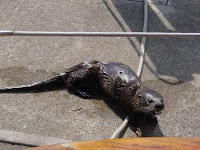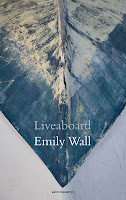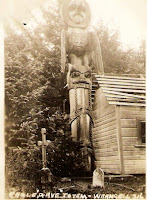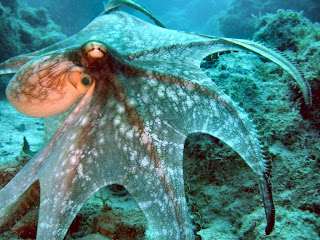TO WRITE BIG, WRITE SMALL
I'm happy to have a guest post by Emily Wall on Planet Alaska:
 Being a nature writer in Alaska feels a little like being a
foodie in a gourmet grocery store. Where
do we even start? It’s
overwhelming. When I first moved to
Alaska 17 years ago, I was fresh out of grad school and fleeing the two cities
I’d lived in. It’s kind of embarrassing
to admit, but I came to Juneau because of a photo in a National Geographic
showing downtown Juneau—Franklin Street actually, in the sweet shadow of Mt.
Juneau. My husband and I got on the next
ferry and stayed for years. But how to
write about it? It was overwhelming. Alaska
is so much, so big, so mythical, and so over-photographed I had no place to
begin.
Being a nature writer in Alaska feels a little like being a
foodie in a gourmet grocery store. Where
do we even start? It’s
overwhelming. When I first moved to
Alaska 17 years ago, I was fresh out of grad school and fleeing the two cities
I’d lived in. It’s kind of embarrassing
to admit, but I came to Juneau because of a photo in a National Geographic
showing downtown Juneau—Franklin Street actually, in the sweet shadow of Mt.
Juneau. My husband and I got on the next
ferry and stayed for years. But how to
write about it? It was overwhelming. Alaska
is so much, so big, so mythical, and so over-photographed I had no place to
begin.
Saying Thank You
is streaming his path through wooden boats—
i t would be
painful to not say thank you—
to understand we are not at the apex
and slipping into water, embracing this fragile skin.
 Bio: Emily Wall is a poet and an Assistant Professor of English at the University of Alaska Southeast in Juneau. She has been published in a wide variety of literary journals and has won several poetry prizes. Her second book of poems, Liveaboard, is being launched this month. Her first book, Freshly Rooted came out in 2007. Both books are published by the Irish Press Salmon Poetry. Emily lives and writes in Juneau, Alaska.
Bio: Emily Wall is a poet and an Assistant Professor of English at the University of Alaska Southeast in Juneau. She has been published in a wide variety of literary journals and has won several poetry prizes. Her second book of poems, Liveaboard, is being launched this month. Her first book, Freshly Rooted came out in 2007. Both books are published by the Irish Press Salmon Poetry. Emily lives and writes in Juneau, Alaska.
LISTEN TO EMILY READ her poem "GRACE HARBOR"
To order my book: http://www.salmonpoetry.com/details.php?ID=251&a=61

To Write Big, Write
Small
 Being a nature writer in Alaska feels a little like being a
foodie in a gourmet grocery store. Where
do we even start? It’s
overwhelming. When I first moved to
Alaska 17 years ago, I was fresh out of grad school and fleeing the two cities
I’d lived in. It’s kind of embarrassing
to admit, but I came to Juneau because of a photo in a National Geographic
showing downtown Juneau—Franklin Street actually, in the sweet shadow of Mt.
Juneau. My husband and I got on the next
ferry and stayed for years. But how to
write about it? It was overwhelming. Alaska
is so much, so big, so mythical, and so over-photographed I had no place to
begin.
Being a nature writer in Alaska feels a little like being a
foodie in a gourmet grocery store. Where
do we even start? It’s
overwhelming. When I first moved to
Alaska 17 years ago, I was fresh out of grad school and fleeing the two cities
I’d lived in. It’s kind of embarrassing
to admit, but I came to Juneau because of a photo in a National Geographic
showing downtown Juneau—Franklin Street actually, in the sweet shadow of Mt.
Juneau. My husband and I got on the next
ferry and stayed for years. But how to
write about it? It was overwhelming. Alaska
is so much, so big, so mythical, and so over-photographed I had no place to
begin.
Thankfully, I started reading Sitka writer Richard Nelson
almost immediately, and in his book The
Island Within he has a beautiful chapter about a hummingbird who flew in
his window and landed on his desk lamp. Reading that, something clicked for
me. We aren’t writing about nature, or about birds, or even about hummingbirds.
We are writing about the hummingbird that one day landed on our desk
lamp. That is how we write (and see) the
natural world. That day I looked up from
my book, and the first thing I saw was a half-built spider web across my window
(my window which has a view of the ocean and the mountain and a
waterfall). I started with the spider
web.
That way of looking at the world stayed with me when I left
Juneau to live in Vancouver, BC for a few years. It was my husband’s turn to do graduate work,
and we decided the only way we could leave Alaska and live in a city again, was
on a boat. So we bought a big, run-down
sailboat, moved aboard, and lived on it for four years. This month my second book of poems, titled Liveaboard, is coming out and it
chronicles that experience.
Today as I flip through the poems in this new book, I see
that my way of writing the natural world hasn’t changed. Many of these poems are about individual
moments and about the minutiae of the natural world. I wanted to write about living on the Fraser
River, about living on a boat, and about living in a community of liveaboards. Like writing about Alaska, that idea was
daunting. But by writing one poem about
a river otter eating crabs, and another about a flotilla of geese, and another
about the drowning death of a friend, those poems started to mosaic to form a
larger picture of the natural world.
Writing this way has made me see this way too. When I’m overwhelmed by oil spills, or genetically modified foods, or by the beauty of a recent avalanche in Juneau, I try to remind myself to start small. Start with one argument, one bird, one feather of snow in my hand.
Saying Thank You
Some
mornings—when the mist is low
on the
harbor water, when a river otteris streaming his path through wooden boats—
to understand we are not at the apex
of
anything, perhaps even our own lives.
What a
relief this is, like shedding jeans and shoesand slipping into water, embracing this fragile skin.
 Bio: Emily Wall is a poet and an Assistant Professor of English at the University of Alaska Southeast in Juneau. She has been published in a wide variety of literary journals and has won several poetry prizes. Her second book of poems, Liveaboard, is being launched this month. Her first book, Freshly Rooted came out in 2007. Both books are published by the Irish Press Salmon Poetry. Emily lives and writes in Juneau, Alaska.
Bio: Emily Wall is a poet and an Assistant Professor of English at the University of Alaska Southeast in Juneau. She has been published in a wide variety of literary journals and has won several poetry prizes. Her second book of poems, Liveaboard, is being launched this month. Her first book, Freshly Rooted came out in 2007. Both books are published by the Irish Press Salmon Poetry. Emily lives and writes in Juneau, Alaska.To order my book: http://www.salmonpoetry.com/details.php?ID=251&a=61






Comments